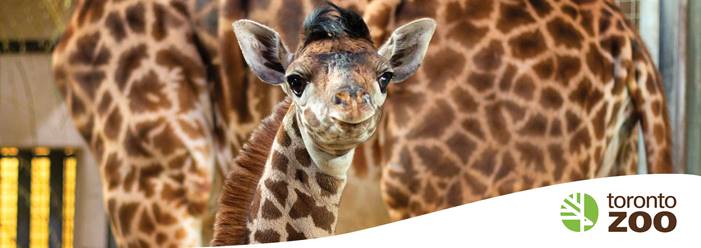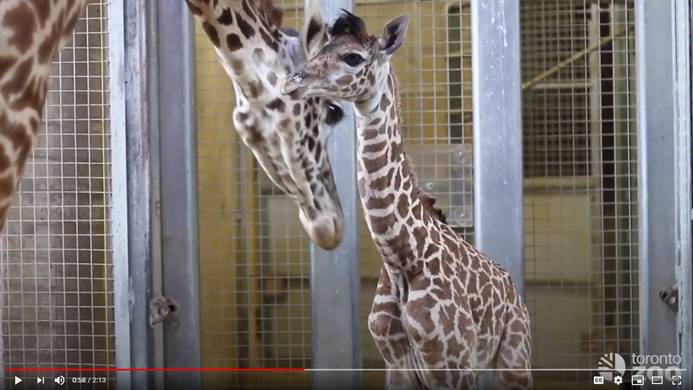
CUTE ALERT! TORONTO ZOO WELCOMES BIRTH OF ENDANGERED MASAI GIRAFFE CALF

To catch a glimpse of #BabyLongLegs,
TORONTO, ON, Wednesday, May 13, 2020: In the early morning hours of Tuesday, May 12, 2020, Mstari, a six-year-old female Masai giraffe (Giraffa camelopardalis tippelskirchi) at the Toronto Zoo, gave birth to a healthy calf. This is the first offspring for both mother Mstari and father Kiko, a seven-year-old male who came to Toronto Zoo from Greenville Zoo in South Carolina in 2015. The pairing of Kiko and Mstari was at the recommendation of the AZA Masai giraffe Species Survival Plan (SSP), a cooperative breeding program among accredited zoos. Both mom and calf are doing well and Wildlife Care Keepers continue to monitor Mstari and calf closely to ensure calf continues to nurse from Mstari regularly.
“This birth is an important contribution to a genetically healthy Masai giraffe population especially as Mstari is the most genetically valuable giraffe in North America,” said Dolf DeJong, Chief Executive Officer, Toronto Zoo. “Masai giraffes are under increasing pressure due to habitat loss and illegal hunting. It is important to educate the public on their plight in the wild and do everything we can to prevent the threats they face and halt declining populations,” he added.
To celebrate this exciting new addition, the Toronto Zoo Wildlife Conservancy has launched a new campaign to raise money to support the growing giraffe family. The Room to Grow Campaign will support many different aspects and modifications including:
- Increasing available space by reconfiguring the existing rooms and equipment
- Allowing for better access to the giraffes by Wildlife Care staff and the veterinary team
- Incorporating features to improve enrichment, educational and monitoring opportunities
“Our Room to Grow campaign launches today, and we are excited to be working with the Toronto Zoo and our supporters to raise $70,000 to complete this important work for our growing giraffe family,” said Beth Gilhespy, Executive Director of the Toronto Zoo Wildlife Conservancy.
Toronto Zoo announced Mstari’s pregnancy as part of our World Giraffe Day celebrations on June 21, 2019. At that time she was five months along in her roughly fifteen-month-long pregnancy, or just past the first trimester (giraffe pregnancies can range from 420-488 days in length). The Toronto Zoo’s Reproductive Sciences branch has been tracking Mstari's reproductive cycles since summer 2017, using fecal hormone analysis to confirm that she was sexually mature and had a 14-day cycle, typical for Masai giraffes. Since then, Wildlife Care Keepers have followed Mstari's reproductive cycles and observed interactions between her and Kiko. Breeding was observed in early and mid-January 2019, and a lack of breeding activity in at the end of January was the first sign of a suspected pregnancy. Using fecal hormone analysis, elevated progesterone (pregnancy hormone) levels were confirmed on February 26, 2019, indicating early pregnancy for Mstari. Wildlife Care Keepers have continued to collect fecal samples three times a week throughout her pregnancy, and are continuing after the birth, in order to add to the global dataset of hormone levels in pregnant and postpartum giraffes.
In December 2018, the conservation status of Masai giraffes was elevated to Endangered by the International Union for Conservation and Nature (IUCN). Fewer than 35,000 Masai giraffes survive in the wild, having experienced more than a 50% decline in the past 30 years. Illegal hunting and habitat loss are their primary threats. The Toronto Zoo is part of the AZA Masai Giraffe Species Survival Plan (SSP) and continues to support field conservation efforts for the species; Mstari is currently the most genetically valuable female in the SSP, and so this calf represents an important genetic contribution to the North American population. The Toronto Zoo has had 19 giraffes born since 1980, and this birth represents the first third-generation Toronto-born giraffe - both Mstari and her mother, Twiga, were also born at the Toronto Zoo.
Follow us on social media for updates on #BabyLongLegs!
-30-
Note to media: The Toronto Zoo continues to remain closed at this time. Zoo staff are focused on the health and well-being of Mstari and her calf and we will share updates as become available. Media/photo opportunities are not permitted at this time.
Media Contact Information:
Katie Gray
Toronto Zoo’s Manager of Strategic Communications
(416) 938-5283
[email protected]
Amanda Chambers
Supervisor of Strategic Communications
[email protected]
